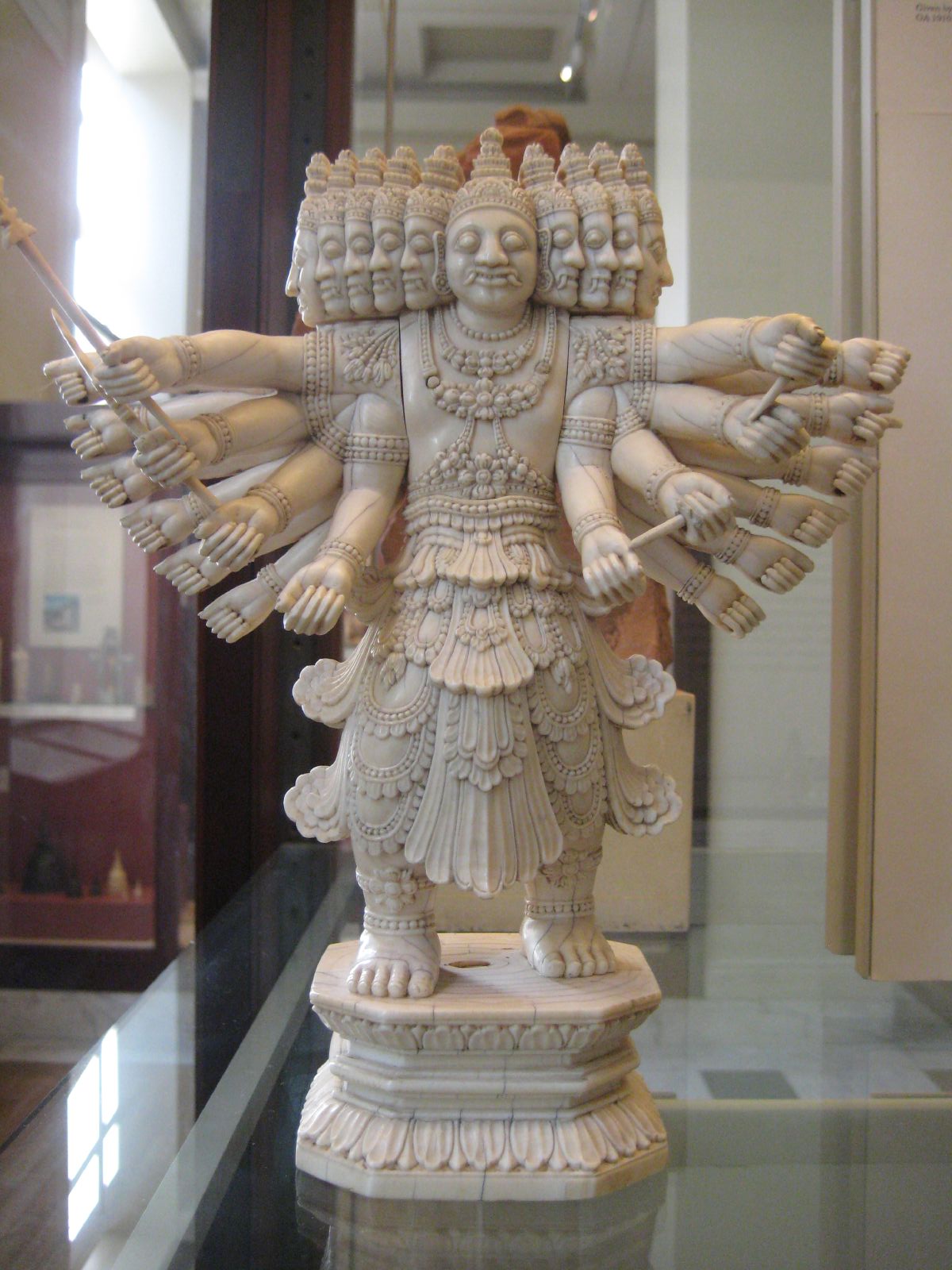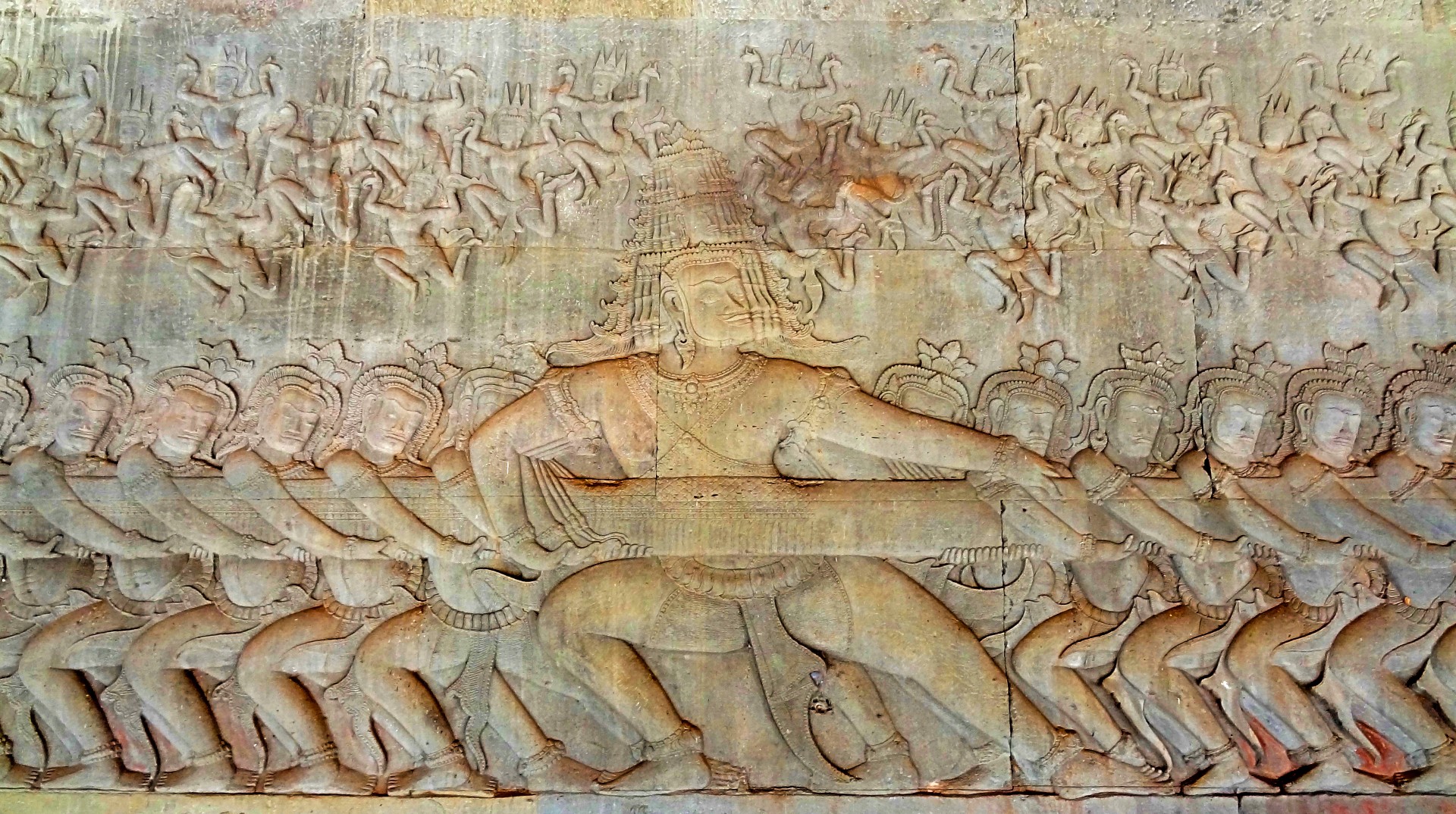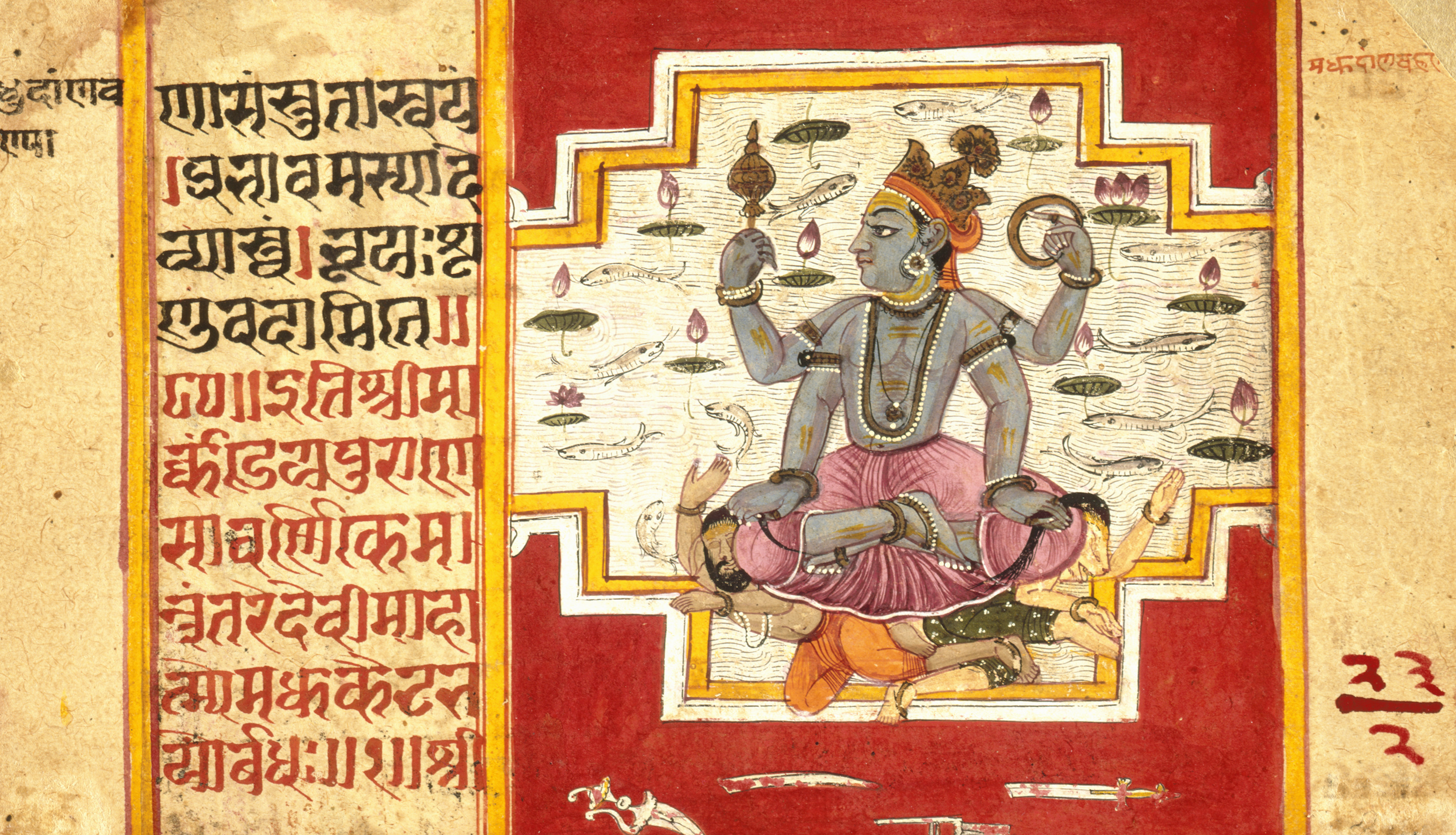|
Trishira
Trishira () is a rakshasa prince featured in the Ramayana. He is one of the sons of Ravana and Dhanyamalini and his brothers are Atikaya, Narantaka and Devantaka. Legend The ''Ramayana'' states that Trishira engaged Rama in a fight and hit him with a number of arrows. At this, Rama told him that his arrows were like flowers being showered on his body. Thereafter, a duel ensued, in which Rama killed Trishira. Trishira and his brother Atikaya are believed to be incarnations of the asuras Madhu and Kaitabha, who were slain by Vishnu during the period of the creation of the universe. See also *Ravana *Ramayana The ''Ramayana'' (; ), also known as ''Valmiki Ramayana'', as traditionally attributed to Valmiki, is a smriti text (also described as a Sanskrit literature, Sanskrit Indian epic poetry, epic) from ancient India, one of the two important epics ... References Trishira Rakshasa in the Ramayana {{Hindu-myth-stub Rakshasa ... [...More Info...] [...Related Items...] OR: [Wikipedia] [Google] [Baidu] |
Ravana
According to the Mahakavya, Hindu epic, ''Ramayana'', Ravana was a kingJustin W. Henry, ''Ravana's Kingdom: The Ramayana and Sri Lankan History from Below'', Oxford University Press, p.3 of the island of Lanka, in which he is the chief antagonist and is considered to be a Rakshasa (demon). In the ''Ramayana'', Ravana is described as the eldest son of sage Vishrava and Kaikesi, Kaikasi. He abducted Rama's wife, Sita, and took her to his kingdom of Lanka, where he held her in the Ashok Vatika, Ashoka Vatika. Rama, with the support of vanara King Sugriva and his army of vanaras, launched a rescue operation for Sita against Ravana in Lanka. Ravana was subsequently slain, and Rama rescued his beloved wife Sita. Ravana was well-versed in the six shastras and the four Vedas, including the Shiva Tandava Stotra. Ravana is also considered to be the most revered devotee of Shiva. Images of Ravana are often seen associated with Shiva at temples. He also appears in the Buddhist Mahayana t ... [...More Info...] [...Related Items...] OR: [Wikipedia] [Google] [Baidu] |
Dhanyamalini
Dhanyamalini, also referred to as Dhanyamala and Dhanyamali, is the second wife of Ravana, the antagonist of the Hindu epic ''Ramayana''. She appears rarely in the epic and is famous as the mother of Atikaya. In some other versions of the ''Ramayana'', Dhanyamali had three sons from Ravana — Narantaka, Devantaka, and Trishira Trishira () is a rakshasa prince featured in the Ramayana. He is one of the sons of Ravana and Dhanyamalini and his brothers are Atikaya, Narantaka and Devantaka. Legend The ''Ramayana'' states that Trishira engaged Rama in a fight and hit .... References Women in Hindu mythology {{Hindu-myth-stub ... [...More Info...] [...Related Items...] OR: [Wikipedia] [Google] [Baidu] |
Atikaya
Atikaya () is the son of Ravana and his second wife Dhanyamalini in the Hindu epic ''Ramayana''. Legend The story of Atikaya is explained by Vibhishana in the ''Ramayana''. Once while filled with rage, he tried to uproot the Chakravalgiri mountain. Shiva noticed this and hurled his ''trishula'' at him, but Atikaya was so powerful at that time that he caught the trident mid-air like a toy and started laughing. Shiva was so impressed by the rakshasa that he taught all the secrets of archery to him. Due to armour of Brahma given to him, Atikaya had to be slain by Lakshmana by using a Brahmastra, a powerful weapon of the god Brahma. The wind-god Vayu, at the behest of the god Indra, revealed to Lakshmana the secret that an otherwise invincible armour of Brahma was granted to Atikaya, that could only be pierced by a Brahmastra. Atikaya and his brother Trishira are believed to be incarnations of the asuras Madhu and Kaitabha, who were slain by Vishnu Vishnu (; , , ), a ... [...More Info...] [...Related Items...] OR: [Wikipedia] [Google] [Baidu] |
Narantaka
Narantaka (Sanskrit: नरान्तक, IAST: narāntaka, lit. ''destroyer of men'') and Devanataka (Sanskrit: देवान्तक, IAST: devāntaka, lit. ''destroyer of Gods'') are asuras and sons of Ravana who appear in a number of Hindu legends. They, along with Atikaya, were the offspring of Ravana and his second wife Dhanyamalini. In the battle of Ramayana, Narantaka was killed by Angada, the son of Bali, whereas Devantaka was slaughtered by the Mace of Hanuman Hanuman (; , ), also known as Maruti, Bajrangabali, and Anjaneya, is a deity in Hinduism, revered as a divine ''vanara'', and a devoted companion of the deity Rama. Central to the ''Ramayana'', Hanuman is celebrated for his unwavering devotio ... in a duel. References Rakshasa in the Ramayana Asura {{Hindu-myth-stub ... [...More Info...] [...Related Items...] OR: [Wikipedia] [Google] [Baidu] |
Ramayana
The ''Ramayana'' (; ), also known as ''Valmiki Ramayana'', as traditionally attributed to Valmiki, is a smriti text (also described as a Sanskrit literature, Sanskrit Indian epic poetry, epic) from ancient India, one of the two important epics of Hinduism known as the ''Itihasas'', the other being the ''Mahabharata''. The epic narrates the life of Rama, the seventh ''avatar'' of the Hindu deity Vishnu, who is a prince of Ayodhya (Ramayana), Ayodhya in the kingdom of Kosala. The epic follows Exile of Lord Rama, his fourteen-year exile to the forest urged by his father King Dasharatha, on the request of Rama's stepmother Kaikeyi; his travels across the forests in the Indian subcontinent with his wife Sita and brother Lakshmana; the kidnapping of Sita by Ravana, the king of Lanka, that resulted in bloodbath; and Rama's eventual return to Ayodhya (Ramayana), Ayodhya along with Sita to be crowned as a king amidst jubilation and celebration. Scholarly estimates for the earliest stage ... [...More Info...] [...Related Items...] OR: [Wikipedia] [Google] [Baidu] |
Narantaka-Devantaka
Narantaka (Sanskrit: नरान्तक, IAST: narāntaka, lit. ''destroyer of men'') and Devanataka (Sanskrit: देवान्तक, IAST: devāntaka, lit. ''destroyer of Gods'') are asuras and sons of Ravana who appear in a number of Hindu legends. They, along with Atikaya, were the offspring of Ravana and his second wife Dhanyamalini. In the battle of Ramayana, Narantaka was killed by Angada, the son of Bali, whereas Devantaka was slaughtered by the Mace of Hanuman Hanuman (; , ), also known as Maruti, Bajrangabali, and Anjaneya, is a deity in Hinduism, revered as a divine ''vanara'', and a devoted companion of the deity Rama. Central to the ''Ramayana'', Hanuman is celebrated for his unwavering devotio ... in a duel. References Rakshasa in the Ramayana Asura {{Hindu-myth-stub ... [...More Info...] [...Related Items...] OR: [Wikipedia] [Google] [Baidu] |
Rakshasa
Rākshasa (, , ; ; "preservers") are a race of usually malevolent beings prominently featured in Hinduism, Buddhism, Jainism and Folk Islam. They reside on Earth but possess supernatural powers, which they usually use for evil acts such as disrupting Vedic sacrifices or eating humans. The term is also used to describe asuras, a class of power-seeking beings that oppose the benevolent devas. They are often depicted as antagonists in Hindu scriptures, as well as in Buddhism and Jainism. The female form of rakshasa is rakshasi (). Hinduism In Puranas Brahmā, in a form composed of the quality of foulness, produced hunger, of whom anger was born: and the god put forth in darkness beings emaciate with hunger, of hideous aspects, and with long beards. Those beings hastened to the deity. Such of them as exclaimed, “Oh preserve us!” were thence called Rākṣasas. Those created beings, overwhelmed by hunger, attempted to seize the waters. Those among them who said, “ ... [...More Info...] [...Related Items...] OR: [Wikipedia] [Google] [Baidu] |
Asura
Asuras () are a class of beings in Indian religions, and later Persian and Turkic mythology. They are described as power-seeking beings related to the more benevolent Devas (also known as Suras) in Hinduism. In its Buddhist context, the word is translated as "titan" or " antigod". According to Hindu texts, the asuras are in constant fear of the devas. Asuras are described in Indian texts as powerful superhuman demigods with good or bad qualities. In early Vedic literature, the good Asuras are called '' Adityas'' and are led by Varuna, while the malevolent ones are called '' Danavas'' and are led by Vritra. In the earliest layer of Vedic texts, Agni, Indra and other gods are also called Asuras, in the sense of their being "lords" of their respective domains, knowledge and abilities. In later Vedic and post-Vedic texts, the benevolent gods are called ''Devas'', while malevolent Asuras compete against these Devas and are considered "enem ... [...More Info...] [...Related Items...] OR: [Wikipedia] [Google] [Baidu] |
Madhu And Kaitabha
Madhu (, ) and Kaitabha (, ), also rendered Madhu-Kaiṭabhas, are the names of two asuras in Hindu scriptures, and are associated with Hindu cosmology. Legend Madhu and Kaitabha both originated from the earwax within the deity Vishnu's ears, while he was in the meditative state of yoganidra. From his navel, a lotus sprouted, upon which Brahma, the creator, sat contemplating the creation of the cosmos. Two dewdrops of water upon the lotus were created by Vishnu. One drop was as sweet as honey, and from that drop emerged Madhu, imbued with the attribute of tamas (darkness). The other drop was hard, and from it was born Kaiṭabha, imbued with the attribute of rajas (activity). According to the Devi Bhagavata Purana, Madhu and Kaitabha originated from Vishnu's earwax, and performed a long period of ''tapas'' devoted to the goddess Mahadevi, employing the Vāgbīja mantra. The goddess granted them the boon of death befalling them only with their consent. The proud asuras then st ... [...More Info...] [...Related Items...] OR: [Wikipedia] [Google] [Baidu] |
Vishnu
Vishnu (; , , ), also known as Narayana and Hari, is one of the Hindu deities, principal deities of Hinduism. He is the supreme being within Vaishnavism, one of the major traditions within contemporary Hinduism, and the god of preservation (sattva). Vishnu is known as ''The Preserver'' within the Trimurti, the triple deity of Para Brahman, supreme divinity that includes Brahma and Shiva.Gavin Flood, An Introduction to Hinduism' () (1996), p. 17. In Vaishnavism, Vishnu is the supreme Lord who creates, protects, and transforms the Hindu cosmology, universe. Tridevi is stated to be the energy and creative power (Shakti) of each, with Lakshmi being the equal complementary partner of Vishnu. He is one of the five equivalent deities in Panchayatana puja of the Smarta tradition of Hinduism. According to Vaishnavism, the supreme being is with qualities (Saguna Brahman, Saguna), and has definite form, but is limitless, transcendent and unchanging absolute Brahman, and the primal Atma ... [...More Info...] [...Related Items...] OR: [Wikipedia] [Google] [Baidu] |
Rakshasa In The Ramayana
Rākshasa (, , ; ; "preservers") are a race of usually malevolent beings prominently featured in Hinduism, Buddhism, Jainism and Folk Islam. They reside on Earth but possess supernatural powers, which they usually use for evil acts such as disrupting Vedic sacrifices or eating humans. The term is also used to describe asuras, a class of power-seeking beings that oppose the benevolent devas. They are often depicted as antagonists in Hindu scriptures, as well as in Buddhism and Jainism. The female form of rakshasa is rakshasi (). Hinduism In Puranas Brahmā, in a form composed of the quality of foulness, produced hunger, of whom anger was born: and the god put forth in darkness beings emaciate with hunger, of hideous aspects, and with long beards. Those beings hastened to the deity. Such of them as exclaimed, “Oh preserve us!” were thence called Rākṣasas. Those created beings, overwhelmed by hunger, attempted to seize the waters. Those among them who said, “w ... [...More Info...] [...Related Items...] OR: [Wikipedia] [Google] [Baidu] |




